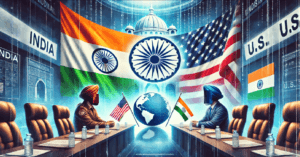India Urges US to Act Against Khalistani Extremists as Tulsi Gabbard Meets Modi
India has urged US intelligence chief Tulsi Gabbard to take action against Khalistani extremists operating in the United States. Defence Minister Rajnath Singh specifically raised concerns about the banned group ‘Sikhs for Justice,’ while National Security Advisor Ajit Doval warned about Khalistani supporters using US soil for terrorism. Canadian-American lawyer Gurpatwant Singh Pannun has been actively making separatist threats against Indian leaders. During their meeting, Prime Minister Narendra Modi presented Gabbard with a vase containing holy water from Prayagraj’s Maha Kumbh Mela.
Gabbard is visiting India on an official tour and is set to speak at the Raisina Dialogue. This marks her second meeting with Modi in two months, following their discussion in Washington in February. Apart from security concerns, India and the US explored collaboration in advanced defense technology, with the Indian Ministry of Defence calling the talks productive. Both sides emphasized security cooperation, military drills, intelligence sharing, and maritime security. Defense industry collaboration was also a key focus. Rajnath Singh later shared on X that the discussions aimed to further strengthen India-US ties.

India Urges US to Act Against Khalistani Extremists as Tulsi Gabbard Meets Modi
India has urged the United States to take strong action against Khalistani extremists operating from U.S. soil. This concern was raised by India’s Defence Minister, Rajnath Singh, during his meeting with the U.S. Director of National Intelligence, Tulsi Gabbard. Singh specifically highlighted the activities of the banned group ‘Sikhs for Justice,’ which has been involved in illegal activities. India is particularly worried about these extremists using the U.S. as a base to promote violence and separatism.
India’s National Security Advisor, Ajit Doval, also addressed the issue in a separate meeting with Gabbard. He expressed concerns about Khalistani supporters in the U.S. encouraging terrorist activities in India. One prominent figure in this movement is Gurpatwant Singh Pannun, a Canadian-American lawyer who has openly advocated separatism and even issued threats against Indian leaders through online videos. India has called on the U.S. to take strict measures to prevent such activities.
During her visit to India, Tulsi Gabbard also met with Prime Minister Narendra Modi. As a gesture of goodwill, Modi presented her with a special vase containing holy water from Prayagraj, a sacred site in India that hosts the Maha Kumbh Mela, the world’s largest religious gathering. Gabbard is in India as part of a multinational official tour and is scheduled to speak at the Raisina Dialogue, a major international conference attended by top security and policy experts.
This marks the second meeting between Modi and Gabbard in two months. They previously met in Washington in February when Modi visited the U.S. and held discussions with then-President Donald Trump. The frequent high-level interactions underscore the growing significance of India-U.S. relations.
Beyond security concerns, Rajnath Singh and Tulsi Gabbard also explored opportunities for collaboration in advanced defense technology and innovation. The Indian Ministry of Defence described their discussions as productive, focusing on strengthening the strategic partnership between the two nations. Both leaders emphasized the need for closer cooperation in security, military exercises, defense industry collaboration, and intelligence sharing, particularly in maritime security.
Following the meeting, Rajnath Singh shared on X (formerly Twitter) that he was pleased to meet Gabbard and discuss a wide range of topics aimed at deepening India-U.S. ties. He stressed the importance of working together to address global challenges and enhance mutual security.
India’s concerns about Khalistani extremists are longstanding. For years, India has urged countries like the U.S. and Canada to take action against groups and individuals supporting separatism and violence. The issue has gained urgency in recent times due to the increasing activities of such groups abroad. India believes these organizations pose a threat not only to its internal security but also to the broader fight against global terrorism.
The discussions between Indian officials and Tulsi Gabbard reflect the strong and evolving partnership between India and the U.S. Both nations are committed to working together on security, defense, and technology. The meetings also demonstrate India’s determination to address extremism while strengthening bilateral cooperation with the U.S.
In summary, India has urged the U.S. to take decisive action against Khalistani extremists operating from American soil. This issue was extensively discussed in meetings between Indian officials and Tulsi Gabbard. Additionally, both sides explored ways to enhance their defense and security partnership. The visit highlights the importance of India-U.S. relations and their shared commitment to tackling global challenges.
You must be logged in to post a comment.